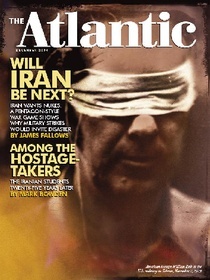
The Atlantic's Jeffrey Goldberg has put up an excellent and authoritative analysis of the strategic problems that Benjamin Netanyahu has created for himself, his party, and his country. It's the most-trafficked item on our site at the moment, so it may seem superfluous to suggest you read it. But if you haven't done so yet, please give it a look.

Once you've read this new item, there's an older article that I hope you'll consider too. It came out in the December, 2004 issue of our print magazine; it was called "Will Iran Be Next?", and as it happens its author was me.
The premise of the article was to conduct a war-game-style exercise to examine the feasibility and effects of an American preemptive strike on Iran's nuclear facilities. The upshot of the exercise was that such a strike could not possibly "work." Set aside questions of whether a bombing raid would "necessary" or "just." From a strictly military point of view, according to the defense-world authorities who took part in our war game, it would almost certainly be a counterproductive failure. It could not put more than a temporary damper on Iran's capacities and ambitions; it would if anything redouble Iran's determination to develop nuclear weapons (so as to protect itself from such strikes in the future); and it could unleash a range a countermeasures that would make the United States rue the idea that this could be a "clean" or "surgical" exercise. You can read it for yourself.
That was more than a decade ago. Since then, Iran's leverage decreased in only one way: there are no longer tens of thousands of U.S. troops next door in Iraq as potential Iranian targets. In all other ways, Iran is ten years further along in protecting its facilities and considering its options. "After all this effort, I am left with two simple sentences for policymakers," our main war-game designer, retired Air Force colonel Sam Gardiner said at the end of the exercise. "You have no military solution for the issues of Iran. And you have to make diplomacy work." That was true then, and truer now.
Here's why I bring the story up. I disagree with one clause in Jeff Goldberg's story — only one, but an important one. It's the part I've put in bold type below:
Whatever the case, the only other way for Netanyahu to stop Iran would be to convince the president of the United States, the leader of the nation that is Israel’s closest ally and most crucial benefactor, to confront Iran decisively. An Israeli strike could theoretically set back Iran’s nuclear program, but only the U.S. has the military capabilities to set back the program in anything approaching a semi-permanent way.
Israel doesn't have the military capacity to "stop" Iran from getting a nuclear weapon, and neither does the United States, at least not in circumstances short of total war.
Why does this matter? As a question of negotiation, I think it's fine for U.S. officials from the president on down to act as if they might seriously be considering a military strike. Presidents G.W. Bush and Obama alike have consistently said that "all options are on the table" when it comes to Iran, and that's fine too. It can be shrewd to keep an opponent guessing about what you might do if provoked.
This negotiating stance could be useful, as long as it doesn't spill over from fooling the Iranians to fooling ourselves. Letting Iran's leaders think the U.S. is contemplating a strike might pay off. Actually contemplating it could be disastrous.
This article was originally published at http://www.theatlantic.com/international/archive/2015/01/please-read-jeffrey-goldbergs-netanyahu-analysisand-this-other-one-too/384888/
